Part 2: Statement of service performance
In this Part, we report on the services that we are funded to deliver, and how well we delivered those services. We discuss:
- Achieving our 2012/13 work programme;
- Output class: Audit and assurance services;
- Output class: Supporting accountability to Parliament; and
- Output class: Performance audits and inquiries.
Achieving our 2012/13 work programme
In our Annual Plan 2012/13, our work programme addressed a central theme, Our future needs – is the public sector ready? We drew on all our audit and assurance work to consider questions we consider are important for the future and how the public sector is preparing for it. We carried out performance audits on specific topics that included pressing matters such as education for Māori children, reducing prisoners' reoffending, our changing and ageing population, and how government organisations use social media. We assessed how the biodiversity and biosecurity services that protect our agricultural exports are managed, and found significant challenges for the public entities that protect our unique national character and the backbone of our economy. We also looked at long-term financial planning in central government and prepared a discussion paper on public sector financial sustainability and a commentary on the Treasury's Affording Our Future: Statement on New Zealand's Long-term Fiscal Position (published in August 2013).
During the year, we developed a framework for analysing public entities' financial results in our reports to Parliament. We also sought information to take stock of asset management practices (see our report Managing Public Assets) and the extent to which those assets are insured (see our report Insuring Public Assets). We drew on our audits of local authorities' long-term plans to discuss matters of financial sustainability in our report on the results of these audits.
We plan to publish an overview of our work on Our future needs – is the public sector ready? While we cannot give absolute assurance on the broad question of whether the public sector is ready to meet future needs, we intend to include comment on technology, capability, prioritising, and effectiveness and efficiency.
Our published reports are available on our website. Appendix 2 lists the major reports that we completed during 2012/13.
Output class: Audit and assurance services
We audit every public entity in New Zealand, from large government departments and district health boards to every school and every local authority. In 2012/13, our annual audits and other assurance services accounted for 87% of our total expenditure.
Annual audits
Annual audits provide independent assurance about the reliability of financial statements – and, in many instances, service performance information – that public entities are required to report. The Auditor-General, as the auditor of every public entity in New Zealand, has a statutory duty to audit that information. We produce an audit report for each audit we carry out, which includes our opinion about the fairness of the presentation of the financial statements (and service performance information, where relevant).
We use our annual audits to gather information about public entities to help us to advise Parliament and others and to help inform our other work. To have a trusted public sector, public entities must fairly report their performance and respond to audit recommendations to improve their systems and controls.
Main processes supporting annual audits
Appointing auditors and monitoring audit fees
The Auditor-General appoints auditors from Audit New Zealand and private sector accounting firms to carry out the annual audits of public entities. When appointing these auditors, the Auditor-General follows principles that are designed to ensure that auditors are independent, audits are of a high quality, and audit fees are reasonable. We regularly monitor the allocation of audits among Audit New Zealand and private sector accounting firms to ensure that these principles are adhered to.
We regularly monitor audit fees to ensure that they are fair to public entities, and provide a fair return to auditors for the work required to meet the Auditor-General's Auditing Standards. In 2012/13, fees were affected by a range of factors, including changes in the scale of operations of some entities, the variable quality of the financial statements and performance information prepared by some entities, and small changes in auditor charge-out rates (the average hourly cost of carrying out audits). Figure 4 summarises the overall increases in audit fees from 2010/11 to 2012/13 based on the agreed audit fees at the time the analysis was prepared. It shows fee increases by sector, and breaks these down to show the separate effects of changes in audit hours and changes in charge-out rates.
Figure 4
Analysis of movements in audit fees
| 2011/12 to 2012/13 | 2010/11 to 2011/12 | |||||||
|---|---|---|---|---|---|---|---|---|
| Number of entities | Increase in total fee | Due to hours | Due to charge-out rate | Number of entities | Increase in total fee | Due to hours | Due to charge-out rate | |
| Central government | 385 | 2.8% | 2.7% | 0.1% | 367 | 3.7% | 2.4% | 1.3% |
| Local government | 430 | 4.1% | 1.9% | 2.2% | 379 | 1.0% | 0.2% | 0.8% |
| Schools | 2420 | 4.2% | 3.9% | 0.3% | 2447 | 4.1% | 0.6% | 3.5% |
| Total | 3235 | 3.4% | 2.6% | 0.8% | 3193 | 2.9% | 1.4% | 1.5% |
Note: The above figures exclude additional audit fees negotiated with public entities as a result of unforeseen issues arising after audit fees had been agreed. These are normally the exception rather than the rule. However, in the current year, we expect the problems with Novopay to result in audit fees for the 2012 school audits to increase by $1.0 million to $1.5 million (10% to 15%) overall. We are working with the Ministry of Education to ensure that the effect on the next round of school audits is minimised.
Maintaining auditor independence
The Auditor-General's staff and appointed auditors from private sector accounting firms must meet high standards of independence. We monitor compliance regularly and all threats to auditors' independence that are identified are addressed by the Auditor-General to eliminate or reduce the threats.
Publishing the Auditor-General's Auditing Standards
The Public Audit Act 2001 requires the Auditor-General's Auditing Standards to be published (at least once every three years) in a report to the House of Representatives. Each annual report must include a description of any significant changes to those standards. In 2012/13, we updated some technical matters in the Auditing Standards, including recognising that the External Reporting Board now sets professional, ethical, auditing, and assurance standards. The updated Auditor-General's Auditing Standards are available on our website.
Carrying out quality assurance reviews
We carry out quality assurance reviews of appointed auditors to ensure that they have complied with the Auditor-General's Auditing Standards. We aim to review the performance of each of our appointed auditors at least once every three years.
We also carry out reviews of each audit firm's quality control systems. These systems are designed to provide assurance about the organisational factors that may affect audit quality. We aim to complete these reviews at least once every three years in conjunction with our quality assurance reviews of appointed auditors.
Responding to regulatory and external reporting changes
During the year, we put into effect a regime similar to the auditor regulation regime that was introduced for the audits of private sector "issuers" from 1 July 2012.5 Our regime applies only to the audits of public sector "issuers" (about 90) that were excluded from the new regulation.
Also during the year, we began preparing for the External Reporting Board's new accounting standards, which come into effect from 1 July 2014. This included providing comment on the proposed new standards. More recently, we have begun to focus on preparing our auditors to audit financial statements that are prepared using the new accounting standards.
Our performance in 2012/13
The impact and output measures we use to assess our performance, and how we have performed against those measures, are set out on the following pages.
We are disappointed that problems with Novopay adversely affected the timeliness and completion of our school audits during 2012/13. This meant we had a significant reduction in the percentage of public entities' audited financial reports being issued within statutory timeframes compared with last year. If we remove the effect of the Novopay situation on the timeliness and completion of audits, our overall performance for annual audits and other assurance services for 2012/13 is comparable to our performance in 2011/12.
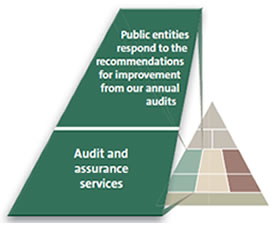
2012/13 results and previous performance for Audit and assurance services
Impact: Public entities respond to the recommendations for improvement from our annual audits
| MEASURE | RESULT | COMMENT | |||
| Central government entities' management control environment (MCE), financial information systems and controls (FISC), and service performance information and associated systems and controls (SPIASC) are improved (or at least maintained), measured against the previous two years. Movements in MCE, FISC, and SPIASC grades provide an indication of whether entities are accepting and responding to our recommendations, and improving their systems and controls. |
Achieved | MCE, FISC, and SPIASC results for 2009/10 to 2011/12 show that, overall, the 2011/12 grades improved when compared with the previous two years. The 2012/13 year grades will be determined during 2013/14. |
|||
| 2009/10 | 2010/11 | 2011/12 | |||
|---|---|---|---|---|---|
| MCE | |||||
| Very good | 50% | 52% | 56% | ||
| Good | 42% | 41% | 39% | ||
| Needs improvement | 7% | 7% | 5% | ||
| Poor | 1% | 0% | 0% | ||
| FISC | |||||
| Very good | 44% | 43% | 47% | ||
| Good | 50% | 51% | 47% | ||
| Needs improvement | 5% | 6% | 6% | ||
| Poor | 1% | 0% | 0% | ||
| SPIASC | |||||
| Very good | 1% | 1% | 4% | ||
| Good | 31% | 52% | 66% | ||
| Needs improvement | 58% | 47% | 30% | ||
| Poor | 10% | 0% | 0% | ||
Impact: Public entities prepare annual financial statements on time to a high standard
| MEASURE | RESULT | COMMENT |
| The percentage of public entities' audited financial reports containing modified audit opinions is reduced (or at least maintained), measured against the previous two years. | Not achieved | The percentage of public entities' audited financial reports containing modified audit opinions has not reduced when compared with the previous two years. The main reason for not achieving this measure during 2012/13 was that we completed more cemetery and administering board audits that had been in arrears than in previous years, and many of the audit reports that we issued for those public entities had modified audit opinions. |
| Figure 5 Percentage of audited financial reports that contain modified audit opinions, 2008/09 to 2012/13 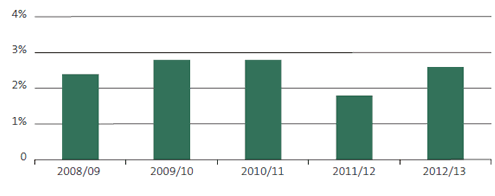 |
||
Impact: Public entities accept management report recommendations and act on them
| MEASURE | RESULT | COMMENT |
| Public entities' acceptance of audit service providers' management report recommendations is improved (or at least maintained), measured against the previous two years. For the year ended 30 June 2013, a sample of 50 entities was assessed against this performance measure. |
Almost achieved | Public entities' acceptance of management report recommendations was almost maintained at the same level as the previous two years, and there was a decrease in the percentage of management report recommendations rejected by public entities. |
| Figure 6 Percentage of management report recommendations accepted by public entities, 2008/09 to 2012/13 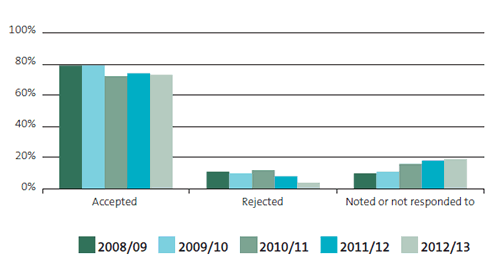 |
||
Output: Audit reports are produced within statutory time frames
| MEASURE | RESULT | COMMENT |
| The percentage of public entities' audited financial reports issued within the statutory time frame is improved (or at least maintained), measured against the previous two years. | Not achieved | The percentage of public entities' audited financial reports issued within the statutory time frame was not maintained. In 2012/13, problems with Novopay had a significant effect on how timely the more than 2400 school audits were completed. School audits make up over more than 60% of the audits we are required to complete each year. |
| Figure 7 Percentage of audited financial reports issued on time, 2008/09 to 2012/13 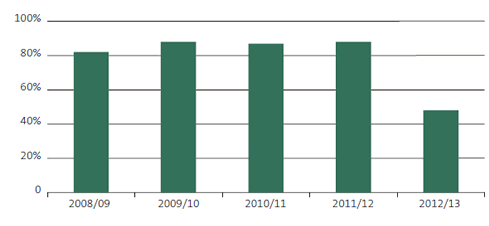 |
||
| Less than 30% of the outstanding audit reports at 30 June are because of inaction on our part. | Achieved | An estimated 7% of the outstanding audit reports at 30 June are because of inaction on our part. This estimate excludes the outstanding audit reports for schools affected by the problems with Novopay. The result reflects our strong focus on audits in arrears during the last three years. |
Output: Management reports are produced within set timeframes
| MEASURE | RESULT | COMMENT |
| All management reports are issued within six weeks of issuing the audit report. | Not achieved | 93% of management reports were issued within six weeks of issuing the audit report, about the same percentage as in previous years. |
Output: Audit reports on local authorities' long-term plans are produced within statutory time frames
| MEASURE | RESULT | COMMENT |
| No outstanding long-term plan (LTP) audit opinions at 30 June of the year in which LTPs are to be adopted by local authorities are because of inaction on our part. | Achieved (in 2011/12) | Audits of long-term plans are carried out every three years. The last audits of long-term plans were carried out in 2011/12, and the next audits will be carried out in 2014/15. |
Output: Objective methods are used to allocate audits and set reasonable audit fees
| MEASURE | RESULT | COMMENT |
| An annual independent review of our processes confirms the probity and objectivity of the methods and systems we use to allocate and tender audits, and monitor the reasonableness of audit fees. | Achieved | The 2012/13 review confirmed that we achieved this measure. We have consistently achieved confirmation of the probity and objectivity of the methods and systems that we use to allocate and tender audits, and to monitor the reasonableness of audit fees. The report, from Sir David Gascoigne, is available on our website. |
Output: Skilled auditors, with a good understanding of public entities, carry out quality audits
| MEASURE | RESULT | COMMENT |
| Client satisfaction survey results show that, overall, 85% of respondents are satisfied with the quality of audit work (including the expertise of staff and the quality of the public entity's relationship with their audit service provider). | Achieved | Overall, 87% of respondents were satisfied with the quality of the audit work, which is an improvement on 83% in 2011/12, and maintains a generally positive long-term trend. |
| Quality assurance reviews for all appointed auditors are completed during a three-year period. Of the auditors reviewed in any given year, 100% achieve a grade of "satisfactory" or better. This measure reports the results of those auditors who were reviewed in 2012/13. |
Not achieved | 89% of auditors reviewed in 2012/13 achieved a grade of "satisfactory" or better. In 2013/14, another review will be performed of the appointed auditors whose audit quality was not satisfactory. These auditors were from small audit firms performing small audits on behalf of the Auditor-General. We expect that they will improve their audit quality to meet our expectations. For those appointed auditors whose audit quality in 2011/12 was not satisfactory, our 2012/13 review found audit quality had improved and they achieved a satisfactory grade. |
Output: We have sufficient resources to do audits effectively
| MEASURE | RESULT | COMMENT |
| The Officers of Parliament Committee accepts any significant proposals for an appropriation increase in audit fees and expenses. | Not applicable in 2012/13 | From 2008/09 to 2012/13, no significant proposal was made for an increase in appropriation. |
Figure 8
Financial performance of output class: Audit and assurance services
|
2012/13
Actual
|
2012/13
Supplementary Estimates
|
2011/12
Actual
|
2010/11
Actual
| |
|---|---|---|---|---|
| $000 | $000 | $000 | $000 | |
| Income | ||||
| Crown | 150 | 150 | 150 | 150 |
| Other | 70,089 | 68,687 | 71,644 | 65,194 |
| Expenditure | (69,448) | (68,837) | (70,729) | (65,043) |
| Surplus/(Deficit) | 791 | - | 1,065 | 301 |
Output class: Supporting accountability to Parliament
We use information from our annual audits of public entities to advise Parliament and our other stakeholders. Our reporting and advice to Parliament identifies and addresses issues and risks in the public sector. Our Controller function provides independent assurance to Parliament that public money has been spent appropriately and lawfully.
Services to Parliament
Our advice and assistance includes:
- reports and advice to select committees to help their financial reviews of public entities and their examination of the Estimates of Appropriations;
- reports to Ministers on the results of the annual audits; and
- reports to Parliament on more general matters arising from our annual audits.
Controller function
The Controller function provides independent assurance to Parliament that expenditure by government departments and Offices of Parliament is lawful, and is within the scope, amount, and period of the appropriation or other authority.
The OAG and appointed auditors carry out standard procedures for the Controller function in keeping with the Auditor-General's Auditing Standards and a Memorandum of Understanding with the Treasury. We review monthly reports that the Treasury provides. We advise the Treasury of any problems and the action to be taken.
Each year, we report to Parliament on any significant Controller matters.
International contribution
We make a significant contribution to the international auditing community by sharing our knowledge and expertise. The Office hosts international delegations to provide opportunities for information exchange and to build professional networks. In 2012/13, we were pleased to help representatives from Myanmar, Indonesia, and Egypt.
We continued our commitment to improving public sector auditing in the Pacific through our role as Secretary-General of the Pacific Association of Supreme Audit Institutions (PASAI), and through the Auditor-General representing PASAI on the governing board of the International Organisation of Supreme Audit Institutions (INTOSAI). As part of our funding agreement with the Ministry of Foreign Affairs and Trade, we took part in a secondment programme with the Samoa Audit Office aimed at helping to build the capacity of the Samoa Audit Office. The programme provided coaching, mentoring, and training to the Chief Auditor of Samoa and five of his staff from February to May 2013.
Our INTOSAI involvement continued. We chaired two working groups tasked with developing guidance for supreme audit institutions (SAIs). One of these working groups is preparing a new INTOSAI standard on the value and benefits of SAIs, which sets out ways that SAIs can add value through their work.
Our performance in 2012/13
Our results for this output class show that our work continues to play an important part in supporting accountability to Parliament. In 2012/13, strong demand for our advice to select committees continued. We provided advice in support of 87 financial reviews and 47 Estimates of Appropriation examinations (95 and 47 in 2011/12).
We asked five select committee Chairs and six other stakeholders about the quality and usefulness of our work. Our stakeholders say that they value our work and the professional and impartial advice and guidance that we give. Select committee Chairs indicated that they value our staff's knowledge and relationship management skills. Their feedback will enable us to focus on ways to better meet our stakeholders' needs.
This year, select committee Chairs gave us feedback on a scale of 1 to 5 (where 1 is worst and 5 is best):
- three out of five Chairs rated the helpfulness of the Office's advice in Estimates of Appropriation and financial review examinations as 4;
- three out of five Chairs, and all six other stakeholders surveyed, rated the relevance and usefulness of our reports and services as 4 or 5;
- two out of five Chairs, and all six other stakeholders surveyed, rated the provision of valuable information on public sector performance through our reports and services as 4 or 5; and
- four of the six other stakeholders surveyed rated our work to improve the performance of, and build trust in, the public sector as 4 or 5.
Our stakeholders also told us that they would like us to engage with them more systematically and provide more information about the Office's broader and longer-term plan of work, including our expectations and priorities. Their comments align with improvements in our strategic planning, which has resulted in, for example, our publication of sector-specific reports.
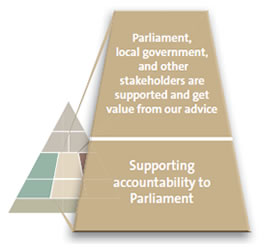
2012/13 results and previous performance for Supporting accountability to Parliament
Impact: Parliament, local government, and other stakeholders are supported and get value from our advice
| MEASURE | RESULT | COMMENT |
| At least 85% of select committee members we survey confirm that our advice assists them in Estimates of Appropriation and financial review examinations. | Not achieved | From 2008/09 to 2011/12, we achieved this target. This year, 60% (three of the five members surveyed) agreed that our advice assists them in Estimates of Appropriation and financial review examinations. We will give attention to the stakeholders' comments about how we can improve our advice to assist their work. |
| Figure 9 Percentage of select committee members who confirmed that our advice assists them in Estimates of Appropriation and financial review examinations, 2008/09 to 2012/13  |
||
Output: Quality advice and timely advice is given to Parliamentary select committees, local government, and other stakeholders
| MEASURE | RESULT | COMMENT |
| At least 85% of other stakeholders we survey rate the advice they receive from us through our reports and services as 4 or better on a scale of 1 to 5 for relevance and usefulness. | Achieved | This measure was reworded in 2012/13 to better reflect the extent of our advisory role. All six stakeholders surveyed agreed that the advice they receive from us through our reports and services is relevant and useful. |
| At least 85% of select committee members we survey rate the advice they receive from us through our reports and services as 4 or better on a scale of 1 to 5 for relevance and usefulness. | Not achieved | This measure was reworded in 2012/13 to better reflect the extent of our advisory role. 60% (three of the five members surveyed) rated the advice they receive from us through our reports and services as 4 or better (on a scale of 1 to 5) for relevance and usefulness. We will give attention to our stakeholders' comments about how we can improve the advice we provide through our reports and services. |
| Reports and advice are given to select committees and Ministers at least two days before an examination, unless otherwise agreed. | Achieved | From 2007/08 to 2012/13, all reports and advice were given to select committees and Ministers at least two days before an examination, unless otherwise agreed. |
| An internal quality assurance review of a sample of financial review, Estimates of Appropriations, and ministerial reports confirms that they meet relevant standards and procedures, including that reports are consistent in their framework and approach, and are peer-reviewed in draft. | Achieved | A 2012/13 review of our financial review and Estimates examination reports found that these were of high quality. Recommendations about the policies and procedures for preparing reports for financial reviews and Estimates examinations have been adopted and will be put into effect before the 2013/14 financial review and Estimates examination briefings. No review was considered necessary in 2011/12. A review in 2010/11 confirmed that appropriate systems were in place and operated effectively. |
Output: Controller function is carried out effectively
| MEASURE | RESULT | COMMENT |
| Internal quality assurance is carried out to gain assurance that our policies, procedures, and standards for the Controller function have been applied appropriately. | Achieved when last reviewed in 2011/12 | A review is carried out at least once every three years. The nature, extent, and frequency of the quality assurance reviews are based on risk. The 2011/12 review confirmed that appropriate systems were in place and operated effectively. Some process improvements were recommended. The next internal quality assurance review will be in 2014/15. |
| Monthly statements provided by the Treasury are reviewed for the period September to June inclusive. Advice on issues arising and action to be taken is provided to the Treasury and appointed auditors within five working days of receipt of the statement. | Achieved | 2008/09 to 2012/13: All monthly procedures were followed and agreed time frames achieved. |
Figure 10
Financial performance of output class: Supporting accountability to Parliament
|
2012/13
Actual
|
2012/13
Supplementary Estimates
|
2011/12
Actual
|
2010/11
Actual
| |
|---|---|---|---|---|
| $000 | $000 | $000 | $000 | |
| Income | ||||
| Crown | 2,460 | 2,460 | 2,760 | 2,460 |
| Other | 156 | 225 | 174 | - |
| Expenditure | (2,515) | (2,685) | (3,047) | (2,442) |
| Surplus/(Deficit) | 101 | - | (113) | 18 |
Output class: Performance audits and inquiries
The Public Audit Act 2001 allows the Auditor-General to carry out performance audits, to inquire into how a public entity uses resources, and to study other matters affecting the public sector. Our performance audits, inquiries, and other studies allow the Auditor-General to consider and provide advice about matters in greater depth than is possible within the statutory scope of an annual audit.
Performance audits are significant and in-depth examinations of effectiveness and efficiency that the Auditor-General chooses to carry out. We plan our work programme carefully to provide Parliament with assurance about how well public entities manage a range of matters and programmes, making recommendations where we consider that improvements can be made.
By contrast, our inquiries work reacts to matters of current public concern. We usually receive 200 to 300 requests for inquiries a year, spanning a wide range of concerns about central and local government entities. Most are dealt with through routine correspondence, but, each year, some require significant work. If there is general public interest in an inquiry, we will usually publicly report the results. The Auditor-General also administers the Local Authorities (Members' Interests) Act 1968, which regulates pecuniary interest matters in the local government sector. Each year, we usually receive 50 to 100 enquiries under that Act.
We also do other studies that result in a range of published reports and information on topical issues affecting public sector accountability and performance.
Our performance in 2012/13
Our reports
In 2012/13, we completed a range of reports on matters arising from performance audits, major inquiries, and other studies. These reports are listed in Appendix 2 and are available on our website.
Our published reports encourage ongoing high performance and performance improvement throughout the public sector. They highlight complexities to be managed and factors that underpin good decision-making and success, and make recommendations for improvement, where appropriate. Our work benefits the audited entities and the wider public sector by informing and promoting strong public sector management and performance.
Relevance, usefulness, and value of our reports
We seek the views of a small sample of select committee members and other stakeholders on the relevance, usefulness, and value of our reports. Overall, stakeholders have a favourable opinion of the quality of our work. This year, 82% of those surveyed agreed that our advice is relevant and useful, and 73% agreed that our reports and services provide valuable information on public sector performance. This is slightly less than our target of 85%. We will give attention to the helpful feedback from stakeholders on how we can increase the relevance, usefulness, and value of our reports by focusing on probity and value for money and using different media to get our message across.
Every two years, two of our performance audit reports are independently reviewed. Overall, our reports were rated highly for quality and our 2013 reports achieved similar ratings to previous years' reports. Ratings improved for our focus on effectiveness, efficiency, and economy, while ratings for usefulness to the customer slightly decreased. We are committed to continuing to improve the quality of our reports by responding to the useful feedback we receive through these reviews.
Public entities' progress in acting on our recommendations
In May 2012, we reported on the progress that public entities had made in acting on the recommendations in our performance audit reports. Good progress was made in addressing most recommendations. We will report again in the first half of 2014, including on what improvements have resulted from entities implementing our recommendations.
Progress with completion of our 2012/13 annual plan
During 2012/13, we carried out work on the theme Our future needs – is the public sector ready? to see how well the public sector was preparing for the future. Appendix 2 contains a list of our major reports completed in 2012/13, where reports relating to the theme are shown in bold. We will conclude our remaining work on the theme (see Figure 11), and an overview report bringing together observations from all of our work on the theme, by the end of 2013.
Figure 11
Our future needs work started in 2012/13 that will be completed by the end of 2013
| 1 | New migrant settlement and contribution |
| 2 | Regional services planning by District Health Boards |
| 3 | Ageing population |
| 4 | Commentary on the Treasury's Statement on New Zealand's Long-term Fiscal Position (published in August 2013) |
| 5 | Board reporting by Crown Research Institutes and State Owned Enterprises |
| 6 | Department of Corrections: Reduction of re-offending |
| 7 | Canterbury recovery – the rebuild of Christchurch's horizontal infrastructure |
| 8 | Canterbury recovery – the Earthquake Commission's home repair programme |
The relevance and usefulness of our 2013/14 work programme
For our 2013/14 work programme, we have adopted a theme of Service Delivery, to see how well the public sector is providing services to the public of New Zealand. We consulted the Speaker and select committees about our proposed work programme. Consultation with Parliament helps us to ensure that the work we do will be relevant and useful to Parliament, public entities, and the public. It is an important way to ensure that our work remains relevant and responsive to the needs of our key stakeholders – Parliament and the public.
The Education and Science Committee, Health Committee, Local Government and Environment Committee, Primary Production Committee, and Social Services Committee all provided feedback, and our final work programme published in our Annual Plan for 2013/14 takes account of the comments that they made.
Inquiries
During 2012/13, we received 188 new requests for inquiries and 35 requests about Local Authorities (Members' Interests) Act matters. Although these figures were lower than usual, our inquiries workload was high.
At the start of 2012/13, we had five large inquiries under way. During 2012/13, we completed and published reports on four of these inquiries:
- aspects of the Accident Compensation Commission's Board-level governance;
- the Government's decision to negotiate with SkyCity Entertainment Group Limited for an international convention centre;
- the decision by Hon Shane Jones to grant citizenship to Mr Yang Liu; and
- how the Far North District Council administered rates and charges due from Mayor Wayne Brown's company, Waahi Paraone Limited.
The fifth of these large inquiries – the Kaipara inquiry – is under way and is discussed below.
Inquiry into Kaipara District Council's management of the Mangawhai community wastewater scheme
In February 2012, the Kaipara District Council (the Council) asked the Auditor-General to carry out a full and independent inquiry into its decision-making and financial and contract management processes for the Mangawhai wastewater scheme. We agreed and released final terms of reference in March 2012.
This inquiry has been unusual in several respects. It is the largest that the Office has carried out for some years and its complexity is exceptional. Our aim is to complete major inquiries within 12 months, but that has not been possible with this inquiry.
Our work on inquiries is usually carried out in private, but in this case we have taken steps to ensure that there is some community involvement. In addition to our normal steps of reviewing files and documents and commissioning expert advice, we addressed a community meeting when we began our work, sought submissions from ratepayers, and spent several days meeting with 93 individuals and groups in Mangawhai to ensure that we understood their concerns.
The inquiry includes reviewing the work of the Council's auditor. Because this audit had been carried out by the Auditor-General's business unit, Audit New Zealand, we arranged for the review to be carried out independently by Neil Cherry, Chair of the New Zealand Auditing and Assurance Standards Board, with support from Des Pearson, a former Auditor-General of Victoria. We intend to release the findings of this review as part of the final inquiry report.
A great deal has happened in Mangawhai and Kaipara while our inquiry has been under way, including further problems being identified with the Council's actions, a rates strike, the appointment of a review team by the Minister of Local Government, the elected members resigning and being replaced by Commissioners, the Council preparing a local Bill asking Parliament to validate its actions in recent years, and the Mangawhai Residents and Ratepayers' Association filing judicial review proceedings challenging the legality of various Council actions in recent years.
There has been constant public and media interest in our progress, which has led us to take the unusual step of providing public updates.
We recognise that the Mangawhai community has had to wait patiently for answers, that the Council cannot make substantial progress until our work is complete, and that other local authorities are also awaiting our findings with interest. Although we are proceeding as quickly as we can, we are equally concerned to ensure that our findings are accurate and that we follow a fair process.
Progress on other inquiries
During 2012/13, we agreed to carry out three other large inquiries. We completed and published reports on two of these – funding of the United Future Party and Nelson Mayor Aldo Miccio's business dealings in China – and are working to complete the third – an inquiry into investment decisions by Delta Utility Services Limited, a subsidiary of Dunedin City Council.
We carried out significant work on eight other inquiry requests to assess the issues before releasing media statements summarising what we had found and setting out our conclusion that no further inquiry work was warranted at that stage. These related to:
- procurement practice at Housing New Zealand Corporation in Christchurch;
- KiwiRail's rolling stock purchases;
- issues relating to the Wharewaka built on Wellington's waterfront;
- management, governance, and oversight of Solid Energy Limited;
- matters relating to the Crown's offer to purchase properties in the Christchurch "red zone";
- problems with the Ministry of Education's payroll system (Novopay);
- concerns about governance and financial management at Hamilton City Council; and
- Auckland Council's consideration of the V8 Supercar event.
We brought forward a total of 30 inquiry requests and three requests under the Local Authorities' Members' Interests Act (LAMIA) from the previous year (including the five large inquiries outlined above), and ended this year carrying forward 21 (and six LAMIA) requests. In terms of workflow, we usually have about 20 inquiry matters open at a time. During the year, we had as many as 47 (and two LAMIA) matters open at the same time.
We met our timeliness goals for general inquiries in central and local government. However, work on the major inquiries took a toll on our resources, and meant that we were unable to meet our usual timeliness standard for LAMIA matters. We are considering what changes to make if this demand continues.
The changing context for our work
Increased public and media scrutiny of the public sector is now common. People communicating with us often already have the main documents from the public entity about the issue concerning them. We note a significant gap between public expectations of auditors (the Auditor-General in particular) and our actual statutory role. We will continue to explain our role and its limits, and to address this gap between what the public expect and what we and other accountability agencies are able to deliver.
The Local Authorities (Members' Interests) Act 1968
We responded to requests on 32 matters relating to the LAMIA in 2012/13. In our 2011/12 Annual Report, we said that we had provided a comprehensive submission to the Department of Internal Affairs in response to its discussion paper on options for reform of the LAMIA. We are disappointed that the Department of Internal Affairs has not been able to progress this work as part of the more general reforms of local government. We will continue to administer the LAMIA and investigate breaches under it for so long as the law remains in force, but we continue to have concerns that the rules are no longer fit for purpose.
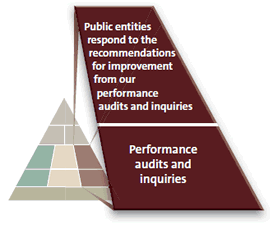
2012/13 results and previous performance for Performance audits and inquiries
Impact: Public entities respond to the recommendations for improvement from our performance audits and inquiries
| MEASURE | RESULT | TREND/COMMENT |
| Entities accept or respond to the recommendations made in our performance audits. | Achieved when last assessed | Every two years, we review how public entities have responded to a selection of our reports and present the results to Parliament. Our next review is in 2013/14. Our May 2012 report, Public entities' progress in implementing the Auditor-General's recommendations 2012, showed that entities had made good progress in putting into effect most recommendations that we made in six performance audit reports published in 2009 and 2010. |
| Entities take action in response to concerns identified in inquiry reports, as assessed by follow-up on a sample of sensitive and major inquiries carried out in the previous year. | Achieved when last assessed | In 2012/13, none of the inquiries were suited to this kind of assessment. In 2011/12, we followed up on three major inquiry reports. In two instances, our recommendations provided the basis for major changes. In one instance, our recommendations were accepted in principle. In 2010/11, we followed up on three inquiries. In all instances, the entities accepted our comments and acted to address the concerns. |
Output: We carry out quality inquiries and performance audits
| MEASURE | RESULT | TREND/COMMENT |
| We complete 19 to 21 reports on matters arising from performance audits and other studies, and inquiries. | Achieved | We have consistently achieved this measure since 2008/09. This year, we completed 22 reports on matters arising from performance audits, major inquiries, and other studies (see Appendix 2). |
| Independent reviews of two performance audits confirm the quality of our reports. | Achieved | Overall, review results confirmed the quality of our reports. We will continue to improve the quality of our reports by responding to the feedback we receive through these reviews. Every year since 2009, reviews have confirmed the quality of our reports and suggested aspects to improve. |
| At least 85% of the select committee members and other stakeholders that we seek feedback from rate the advice they receive from us through our reports and services as 4 or better on a scale of 1 to 5 for relevance and usefulness. | Mostly achieved | This measure was reworded in 2012/13 to better reflect our advisory role. Of those surveyed, 82% agreed that "the advice we receive from the Office of the Auditor-General through its reports and services is relevant and useful". We will give attention to the stakeholders' comments about how we can improve our reports. |
Output: Our inquiries are completed in a timely way
| MEASURE | RESULT | TREND/COMMENT |
| 80% of our findings on completed inquiries are reported to the relevant parties within three months for routine inquiries, six months for significant inquiries, and 12 months for major inquiries. | Achieved | 88% of findings for routine inquiries were reported within three months, and 92% of findings for significant inquiries were reported within six months. We completed four major inquiries in 2013, all within 12 months. This does not include major inquiries not yet completed at 30 June 2013, such as the inquiry into Kaipara District Council's management of the Mangawhai community wastewater scheme. |
| Figure 12 Percentage of findings on routine inquiries and significant inquiries reported to the relevant parties within the target period, 2008/09 to 2012/13 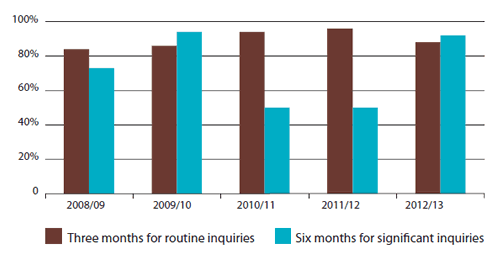 |
||
| Figure 13 Number of findings on major inquiries reported to the relevant parties within the target period, 2008/09 to 2012/13 |
||
| Year | Completed major inquiries | Reported within 12 months |
|---|---|---|
| 2012/13 | 4 | 4 |
| 2011/12 | 1 | 1 |
| 2010/11 | 3 | 1 |
| 2009/10 | 5 | 4 |
| 2008/09 | 2 | Both reported within 13 months |
| MEASURE | RESULT | TREND/COMMENT |
| For enquiries under the Local Authorities (Members' Interests) Act 1968, we complete 90% of enquiries within 30 working days. | Not achieved | 59% of enquiries were completed within 30 working days. Pressure from servicing major inquiries this year meant that we did not maintain the timeliness of our LAMIA work. |
| Figure 14 Percentage of enquiries under the Local Authorities (Members' Interests) Act 1968 completed within 30 working days, 2008/09 to 2012/13 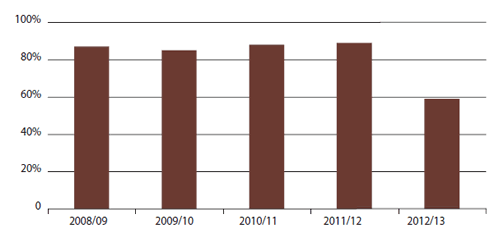 |
||
Output: We apply good methodology to inquiries and performance audits
| MEASURE | RESULT | TREND/COMMENT |
| Our performance audit methodology reflects good practice for carrying out such audits, as assessed every second year by the Australian National Audit Office. | Achieved | In 2013, the Australian National Audit Office reviewed two of our performance audits and found that the audits were largely carried out in keeping with OAG processes and practices. The review identified useful opportunities for improvement. We will act on these. |
| Internal quality assurance reviews on selected performance audit reports confirm that reports are prepared in keeping with the performance audit methodology. The nature, extent, and frequency of the reviews are based on risk. A review is carried out at least once every three years. |
Achieved when last reviewed in 2010/11 | The last review in 2010/11 confirmed that appropriate systems and controls were in place and that reports were prepared in keeping with the performance audit methodology. Another review will be carried out in 2013/14. |
| Responses to requests for inquiries and our administering of the Local Authorities (Members' Interests) Act 1968 requests are in keeping with relevant policies, procedures, and standards, as confirmed by internal quality assurance review. | Achieved when last reviewed in 2010/11 | No internal quality assurance review was considered necessary in 2012/13. Reviews in 2010/11 were completed for general inquiries and the LAMIA enquiries systems, and confirmed that responses to requests were in keeping with relevant standards. Another review will be carried out in 2013/14. |
Output: We deliver an appropriate work programme of inquiries and performance audits
| MEASURE | RESULT | TREND/COMMENT |
| Select committees and other stakeholders are satisfied with the proposed work programme of performance audits (as indicated by feedback on our draft annual work programme). | Achieved | We received useful comments from several select committees and other stakeholders, which we considered in finalising our work programme to ensure that our work remains relevant and responsive to the needs of our main stakeholders. Feedback from 2008/09 to 2011/12 mainly supported our proposals and approach, with useful suggestions for improving the scope of some performance audits. |
Figure 15
Financial performance of output class: Performance audits and inquiries
|
2012/13
Actual
|
2012/13
Supplementary Estimates
|
2011/12
Actual
|
2010/11
Actual
| |
|---|---|---|---|---|
| $000 | $000 | $000 | $000 | |
| Income | ||||
| Crown | 6,587 | 6,587 | 6,287 | 6,587 |
| Other | - | - | - | - |
| Expenditure | (6,550) | (6,587) | (5,790) | (5,991) |
| Surplus/(Deficit) | 37 | - | 497 | 596 |
5: "Issuers" are legal entities that prepare, register, and sell securities to the public for the purpose of financing their operations. For example, Port of Tauranga Limited, Auckland Council, and Kiwibank Limited.
